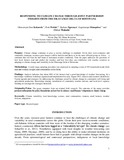Please use this identifier to cite or link to this item:
http://hdl.handle.net/10311/1311Full metadata record
| DC Field | Value | Language |
|---|---|---|
| dc.contributor.author | Kolawole, Oluwatoyin Dare | - |
| dc.contributor.author | Wolski, Piotr | - |
| dc.contributor.author | Ngwenya, Barbara | - |
| dc.contributor.author | Mmopelwa, Gagoitseope | - |
| dc.contributor.author | Olekae, Thakadu | - |
| dc.date.accessioned | 2014-12-11T06:46:32Z | - |
| dc.date.available | 2014-12-11T06:46:32Z | - |
| dc.date.issued | 2014 | - |
| dc.identifier.citation | Kolawole, O.D. et al. (2014) Responding to climate change through joint partnership: insights from the Okavango Delta of Botswana, World Journal of Science, Technology and Sustainable Development, Vol. 11, No. 3, pp.170 -181 | en_US |
| dc.identifier.issn | 2042-5945 | - |
| dc.identifier.uri | http://hdl.handle.net/10311/1311 | - |
| dc.description.abstract | Purpose: Climate change continues to pose a serious challenge to mankind. Given their socio-economic and vulnerable situations, resource-poor farmers will be hard hit and likely to be the most affected group in Africa – a continent that will bear the full brunt of inclement weather conditions. The purpose of this paper is to address the questions of how local farmers read and predict the weather, and how best they can collaborate with weather scientists in adapting to climate change and variability in the Okavango Delta of Botswana. Methodology: A multi-stage sampling procedure was employed in sampling a total of 592 households heads (both men and women) in eight rural communities in the Okavango Delta, Botswana. Findings: Analysis indicates that about 80 per cent of the farmers had a good knowledge of weather forecasting. In a knowledge validation workshop organised and implemented in early August 2012, farmers and scientists identified a nine-point agenda and strategies for addressing the challenges posed by climate change to community well-being and agricultural production. Knowledge sharing, installation of community weather stations and local-level capacity building are amongst the strategies identified. Originality/value: The paper emanates from original field research. The outcome of the paper provides pertinent information for policy formulation on how best to enhance small farmers’ adaptation to climate change. | en_US |
| dc.description.sponsorship | The SysTem for Analysis, Research and Training (START) and the US National Science Foundation (NSF) | en_US |
| dc.language.iso | en | en_US |
| dc.publisher | Emerald, www.emeraldinsight.com | en_US |
| dc.subject | Climate viability | en_US |
| dc.subject | local knowledge | en_US |
| dc.subject | science | en_US |
| dc.subject | rural communities | en_US |
| dc.subject | women | en_US |
| dc.subject | small farmers | en_US |
| dc.subject | weather forecast | en_US |
| dc.subject | adaption | en_US |
| dc.title | Responding to climate change through joint partnership: insights from the Okavango Delta in Botswana | en_US |
| dc.type | Published Article | en_US |
| dc.link | http://www.emeraldinsight.com/doi/abs/10.1108/WJSTSD-06-2014-0010 | en_US |
| Appears in Collections: | Research articles (ORI) | |
Files in This Item:
| File | Description | Size | Format | |
|---|---|---|---|---|
| OLUWATOYINKOLAWOLE 2.pdf | Main article | 647.09 kB | Adobe PDF |  View/Open |
Items in DSpace are protected by copyright, with all rights reserved, unless otherwise indicated.
